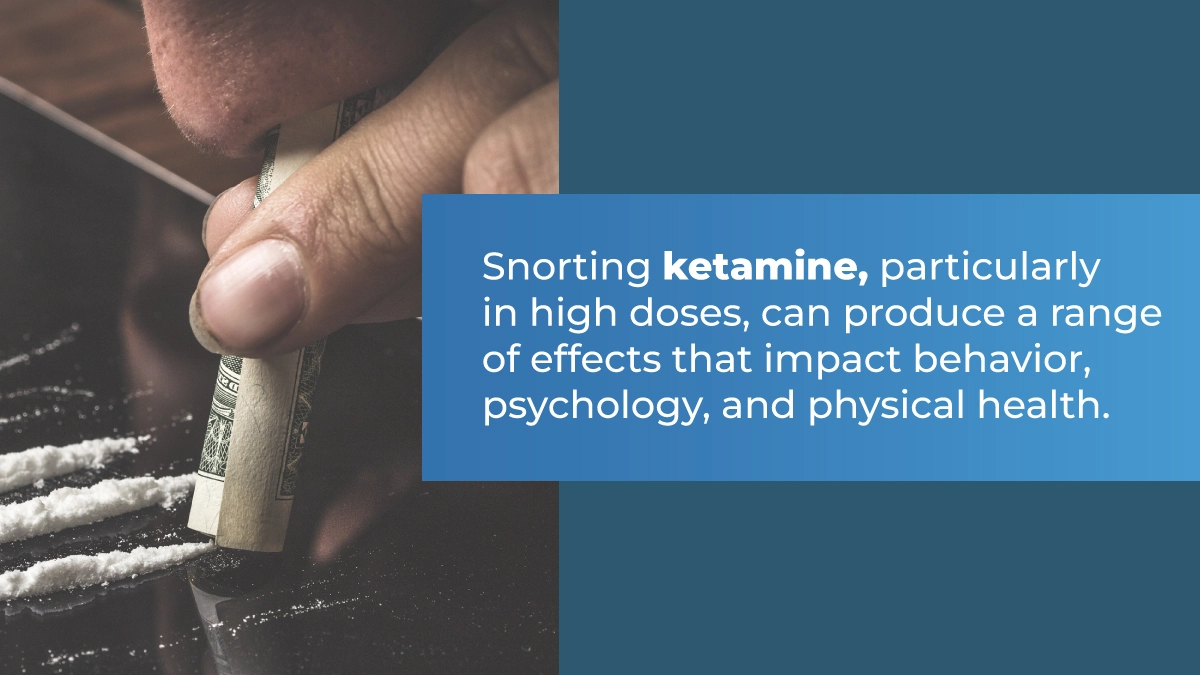
Lyrica With Suboxone: Risks And Safe Practices
The Recovery Team-Newton explores whether taking Lyrica with Suboxone is safe. Explore potential risks and guidelines

Ketamine is a medication often used in medical settings for anesthesia. However, it is sometimes misused for its hallucinogenic effects, creating a sense of detachment from reality.
When snorted, ketamine can produce intense and unpredictable effects that may impact both physical and mental health. This method of use can quickly change mood, perception, and sensory experiences, which leads to a range of outcomes that might be harmful. Continue reading to find out more about snorting ketamine and the health risks it poses.
Snorting ketamine has euphoric effects but poses severe health consequences. Here’s what you need to know:
The Recovery Team-Newton provides ketamine addiction treatment to help you break free from it. Don’t hesitate to call us at (508) 978-2772 today.

Ketamine, initially developed in the 1960s as an anesthetic, is a dissociative drug that has gained attention for its recreational use. It’s commonly used in powder form and often snorted to achieve a quick onset of effects.
The process involves placing small lines of ketamine powder on a flat surface. Individuals inhale the powder through the nose using a rolled-up paper or straw. This method of ingestion allows the drug to be absorbed rapidly through the nasal lining. People use this technique to experience the intense, dream-like state associated with ketamine.
However, snorting ketamine can lead to serious health issues, including nasal damage and irritation. It also increases the risk of encountering a K-hole, a state of profound disconnection from reality.
Regular recreational use of ketamine in this way can contribute to ketamine addiction and other adverse outcomes. Despite its medical applications for treatment-resistant depression, misuse as a club drug poses significant risks.
Snorting ketamine, particularly in high doses, can produce a range of effects that impact behavior, psychology, and physical health. While ketamine hydrochloride is sometimes used medically, ketamine abuse as an illicit drug can lead to severe consequences.
Using ketamine can cause noticeable changes in behavior. Even a small amount of powder can result in an out-of-body experience, making it challenging for individuals to interact normally with their environment.
Young adults are often drawn to use ketamine for its sedative experience. When used excessively, ketamine may lead to behavioral changes associated with addiction, such as neglecting responsibilities, strained relationships, or increased impulsivity.
Psychologically, ketamine may induce profound changes in perception and mood. People might experience impaired short-term memory, attention, and decision-making abilities, particularly with repeated use.
Individuals also experience severe confusion, often feeling detached from reality. Prolonged use can lead to severe damage to the brain, affecting cognitive functions and emotional regulation.
Physically, snorting ketamine can have several harmful effects. Chronic use can cause chest pains, high blood pressure, and issues with the liver. Additionally, repeated nasal use can lead to infectious diseases due to the introduction of contaminants into the nasal passages.
When it comes to using ketamine, the method of administration significantly impacts the effects of ketamine. Comparing snorting to other routes helps us understand how this practice differs in onset, duration, and absorption.
Snorting ketamine leads to a quicker onset of effects compared to methods like oral ingestion. When snorted, the dissociative effects of ketamine are felt almost immediately as the drug rapidly reaches the bloodstream through the nasal lining.
This rapid onset can create intense and sometimes overwhelming experiences. The effects of snorting ketamine typically last around 1 to 2 hours, whereas oral ingestion results in a slower onset but a longer duration of effects, usually lasting 3 to 4 hours. This difference in duration can influence the likelihood of having a bad experience or needing repeated doses to maintain the desired effects.
The absorption process varies significantly across different routes of administration. When snorted, ketamine in your system is absorbed through the mucous membranes in the nose, leading to a rapid entry into the bloodstream. This method can pass through the digestive system and liver metabolism, causing more immediate and intense effects.
In contrast, oral ingestion involves a slower absorption process through the gastrointestinal tract, leading to a more gradual onset of effects. While snorting may lead to a quicker high, it also carries risks of long-term effects such as nasal damage and increased potential for abuse.
Snorting ketamine can lead to a variety of noticeable symptoms. These signs reflect both the physical effects and potential mental health problems associated with ketamine abuse. Individuals may experience a range of immediate and severe symptoms due to the drug’s impact on the body and mind.
Frequent use can lead to bladder problems and muscle rigidity. These signs underscore the importance of recognizing the harmful effects of ketamine and addressing them promptly to prevent further drug use and physical damage. Monitoring symptoms and seeking help can mitigate the risks associated with this class of drugs.
Using ketamine, especially as a recreational drug or party drug, carries risks. Implementing harm reduction strategies can help prevent severe adverse effects and ensure safety.
If snorting ketamine, it’s crucial to adopt safe snorting practices. Using a clean, personal tool for inhalation can reduce the risk of infectious diseases.
Avoid sharing snorting devices and be mindful of the amount used to prevent intense dissociative effects. Limiting the frequency of use can help minimize the risks of long-term damage.
Understanding and recognizing overdose symptoms is vital. Signs include disorientation, slowed breathing, and muscle rigidity.
Patients may also experience severe nausea and vomiting, indicating the potential for a near-death experience. Awareness of these symptoms can prompt timely action to prevent serious harm.
Promptly seeking medical assistance is essential if any severe symptoms arise. Healthcare professionals may provide behavioral therapies and other treatments to address the physical and psychological effects of ketamine misuse. Addressing these issues early can help manage and mitigate the risks associated with ketamine abuse.
Ketamine is a medication commonly used for pain management and medical use. It was originally developed as an anesthetic for surgeries. In its medical form, ketamine helps manage pain and induce anesthesia.
It is usually administered intravenously or as an intramuscular injection in clinical settings. Ketamine use has also expanded to treating conditions like depression when prescribed by healthcare professionals.
However, improper use can lead to unwanted withdrawal symptoms and other health issues. It’s essential to use ketamine under medical supervision to avoid complications and ensure safe treatment.
Snorting ketamine poses several risks. It can cause nasal damage, leading to irritation or infections. The drug’s dissociative effects may result in disorientation and impaired judgment, increasing the risk of accidents.
High doses can lead to severe adverse effects such as increased heart rate and high blood pressure, potentially causing cardiovascular issues. Regular use can also lead to muscle weakness and bladder problems. Additionally, snorting ketamine can contribute to ketamine addiction and other health complications, making it crucial to avoid misuse and seek help if necessary.
Signs of ketamine addiction can include an increased need to use the substance more frequently or in larger amounts to feel the same effects. Individuals may develop cravings, experience withdrawal symptoms like agitation or confusion, and lose interest in activities they once enjoyed.
They may also show mood changes, memory problems, or reduced attention. Physical symptoms can include dizziness, impaired coordination, or urinary problems.
Social signs might involve neglecting responsibilities, financial issues, or withdrawing from loved ones. If these signs appear, it is important to seek help from a healthcare professional or addiction specialist for support and guidance.
If you or your loved one is struggling with ketamine addiction, then contact The Recovery Team-Newton.
We provide ketamine abuse treatment in a secure environment with tailored treatment options. For intensive care and support with a flexible treatment approach, we offer an intensive outpatient program for long-term recovery.
Our day treatment provides a holistic treatment plan that fits your daily routine schedule while getting the help you need to overcome ketamine addiction. Our medication-assisted treatment combines medication and therapy to alleviate withdrawal symptoms and help your body recover from the effects of ketamine.
Let us become part of your recovery journey. Contact us at (508) 978-2772 today.

The Recovery Team-Newton explores whether taking Lyrica with Suboxone is safe. Explore potential risks and guidelines

Learn about Suboxone injection side effects and explore recovery solutions in this guide by The Recovery Team-Newton.